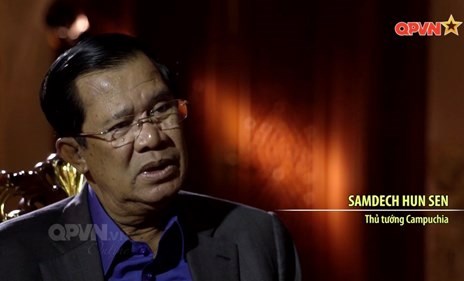The documentary is unique as the film crew managed to find archived documents as evidence and let the characters tell their own stories, including PM Hun Sen. His private and revolutionary life links closely with the destiny of his nation.
The documentary has a significantly important historical role, especially in educating the young generations about the crimes of the Pol Pot genocidal regime as well as Vietnam’s impartial and virtuous assistance to help Cambodia to get rid of that terrible regime.
A rare factual documentary
The documentary, which is full of factual information, received special attention from the public when it was aired in Cambodia and Vietnam. According to Prof. People’s Educator Vu Duong Ninh of the Hanoi National University, the documentary provided true information told by Hun Sen and his comrades and therefore, it has a significantly objective and true historical value.
    |
 |
|
Cambodian PM Hun Sen in an interview in the documentary |
“In the documentary, Hun Sen recalled the first two meals that he and his comrades were treated to. The meals illustrated the natural humanitarian spirit of the Vietnamese, which surprised them,” said Prof. Vu Duong Ninh after watching the documentary on the Vietnamese National Defense Channel.
Those were the first two meals that Hun Sen and his comrades had after walking through across the jungles into Vietnam; and they were received by the Vietnamese side without inspection, and were humanitarianly treated as other Cambodian refugees had also been. Those were also meals with lots of rice they had after months of eating poor quality porridge in their own country.
The considerate and sincere care and the impartial and pure assistance from Vietnam during the time Hun Sen and his comrades stayed in Vietnam were repeatedly mentioned in various examples in the documentary.
Prof. Vu Duong Ninh held that the documentary should be broadcast more popularly in Vietnam, not only in Cambodia.
The documentary also plays an important role in clarifying Vietnam’s support to help the Cambodian people overthrow the genocidal regime.
“Respecting Cambodia’s sovereignty, independence, and democracy was the phrase that was echoed by Vietnamese leaders... Vietnam has a crystal clear principle of respecting independence and sovereignty of other countries,” said Hun Sen in the documentary.
That detail really helps the young generation, especially in Cambodia, understand about a period in Cambodian history and Vietnam’s support.
“The young generation in Cambodia today knows little about the time their country was ruled by the Khmer Rouge. Some even think that Vietnam invaded Cambodia. They cannot differentiate the meaning of two words “liberate” from “invade.” The documentary wil enlighten them,” said a Cambodian Army general.
Private story – national grief
The stories told by the characters have many valuable details. For instance, Hun Sen showed a scar on his leg and told that he was bitten by a dog but he did not let his comrades shoot the dog as it was taking care of its puppies. Hun Sen told that story to contrast with his own situation when he was not allowed to bury his newly-born child who died as a result of a broken spine when a nurse accidentally dropped her on the floor.
Hun Sen’s family was separated and faced lots of grief and losses, even sacrificing their own lives. He only met his son when the country was liberated from the Pol Pot's genocidal regime. That private story of a family represents life of the Cambodians under Khmer Rouge rule. However, with his patriotism, Hun Sen decided that there was only one path to liberate his country: asking for Vietnam’s assistance.
Hun Sen said that he had only 0.1% of success and knew that he might die, but he decided to go to Vietnam. He was also aware of the fact that there was another option: everyone would be killed by Pol Pot if no action was taken. “Another option was committed suicide,” said Hun Sen in the documentary.
He revealed that he brought 12 needles in his pocket at that time, ready to cut his own throat if Vietnam returned him to Cambodia.
It is not easy to analyze all of the valuable details in the documentary. With its positive influence several days after being aired, surely researchers on Vietnam and Cambodia worldwide will pay more attention to the documentary for its compelling facts.
Translated by Nam Long